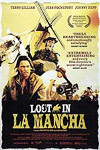Lost in La Mancha (R) ★★★½
 An amusing and insightful documentary that chronicles director Terry Gilliam's ill-fated attempt to bring his personal vision of Don Quixote to the big screen.
An amusing and insightful documentary that chronicles director Terry Gilliam's ill-fated attempt to bring his personal vision of Don Quixote to the big screen.
Story
Cervantes' epic tale The Man From La Mancha tells the tale of Don Quixote, a deluded old man who, intent on conquering the evils of the world, garbs himself in makeshift armor only to end up stabbing windmills. In the end, he dies a long, slow, painful death while confronting his insanity. It's a tragic story with unique parallels to director Terry Gilliam's own filmmaking heroics. Whether fighting studio execs who wanted to butcher his film Brazil, or battling financiers over his escalating budget for The Adventures of Baron Munchausen, Gilliam positioned himself as the idealistic mad artisan combating Hollywood dream killers. Nowhere is this more evident than in his 10-year-long attempt to get The Man Who Killed Don Quixote on celluloid, the infuriating pre-production and disastrous six-day shoot of which are captured in Keith Fulton and Louis Pepe's documentary Lost in La Mancha. Gilliam failed to receive financial backing here in the States, but the director was eventually able to secure funds from an all-European consortium. From the onset of production in September 2000, the director was plagued with language barriers, actors limited by time restraints or worrisome medical problems, terrible soundstage acoustics, and a desert location that turned out to be a practice range for NATO fighter bombers. Filming got underway, nonetheless, with the French actor Jean Rochefort as the questionable hero and Johnny Depp as a cynical ad exec transported back to the 17th century whom Quixote mistakes for his sidekick, Sancho Panza. But on the sixth day of filming, after flash floods had nearly wiped out the set and the 70-year-old Rochefort had developed a double-herniated disk that would keep him from riding a horse indefinitely, and with the film's insurance company facing a multimillion-dollar disaster, Gilliam, sadly, pulled the plug on production.
Direction
All may not have been lost, however. Fulton and Pepe, who documented Gilliam's 12 Monkeys in The Hamster Factor and Other Tales of Twelve Monkeys back in 1995 (noted Gilliam: ''I want to have witnesses in case something goes wrong''), earned the director's trust, and he asked them to record the Quixote proceedings. The resulting film, Lost in La Mancha, is a well-paced series of vignettes and candid interviews, complete with easygoing narration by Jeff Bridges (who starred in Gilliam's The Fisher King) and funny, informative cartoons similar to Gilliam's ribald doodling from Monty Python. Fulton and Pepe convinced Gilliam to wear a wire mic throughout the ordeal and captured just about every conceivable aggravating moment--and some of the most surreal, like Gilliam filming the huge, blubbery men cast as giants bounding over a sand dune, and the film's financiers watching Depp wrestle a fish on set. ''Near the end of the six days of principal photography,'' notes Pepe, ''we were expecting frogs to start falling from the sky.''
Acting
Gilliam is obviously the star here--only he's not acting. It's difficult to imagine the twisted genius who filmed the mind-bending imagery of Fear and Loathing in Las Vegas and Time Bandits as such a regular guy. Putting a major motion picture together is no easy task regardless of circumstances, but Gilliam, outlining storyboard sketches, negotiating with insurance adjusters, or advising actors on their scenes, handles himself with finesse and good humor throughout. There are a few times when he looks ready to blow a gasket, like when the actors tackle an unrehearsed scene; at other times, dementedly giggling over a minute fraction of success, he comes off like a closet lunatic at wits' end. But as catastrophic as the Quixote production is, Gilliam remains down-to-earth and blithely optimistic--even when fighter jets explode the air overhead and drown out his dialogue. His look of disappointment when he finally realizes forces are against him and there's no way in hell is he going to get this movie made--at least not this time around--is heartbreaking, to say the least.
Bottom Line
Lost in La Mancha may not appeal to a general audience, but fans of Monty Python, Gilliam, and behind-the-scenes Hollywood will enjoy this compelling, entertaining and multi-layered commentary on one filmmaker's struggle to maintain artistic vision.
To get the full Quicklook Films experience, uncheck "Enable on this Site" from Adblock Plus
box office top 10

Civil War Released: April 12, 2024 Cast: Kirsten Dunst, Wagner Moura 11.1M

Abigail Released: April 19, 2024 Cast: Melissa Barrera, Dan Stevens 10.2M

Godzilla x Kong: The New Empire Released: March 29, 2024 Cast: Rebecca Hall, Brian Tyree Henry 9.5M

The Ministry of Ungentlemanly Warfare Released: April 19, 2024 Cast: Henry Cavill, Eiza Gonzalez 9M

Spy x Family Code: White Released: April 19, 2024 Cast: Takuya Eguchi, Saori Hayami 4.9M

Kung Fu Panda 4 Released: March 8, 2024 Cast: Jack Black, Viola Davis 4.6M

Ghostbusters: Frozen Empire Released: March 22, 2024 Cast: Paul Rudd, Carrie Coon 4.4M

Dune: Part Two Released: March 1, 2024 Cast: Timothée Chalamet, Rebecca Ferguson 2.9M

Monkey Man Released: April 5, 2024 Cast: Dev Patel, Sikandar Kher 2.2M

The First Omen Released: April 5, 2024 Cast: Nell Tiger Free, Bill Nighy 1.7M






